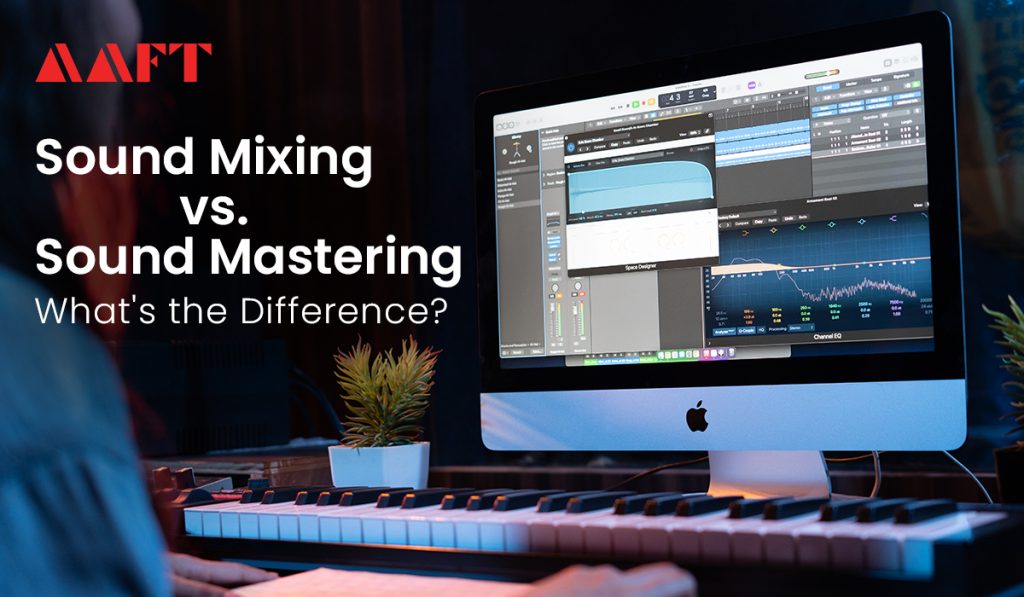Sound Mixing vs. Sound Mastering: What’s the Difference?
Engineering sound is an immensely technical job and to be honest, there are very few people outside of the industry who know truly well what goes on inside the process. Even technicians, vocalists and artists who have been in the circuit for years are often not fully aware of what these processes constitute.
You must have heard of the terms ‘mixing’ and ‘mastering’ very vaguely and you might have even used the terms interchangeably on countless occasions. It is finally the time to get to know the differences between the processes of Mixing and Mastering sound and their unique use cases.
The Definitions–Sound Mixing and Mastering
Mixing is the step where sound engineers layer the tracks and instrumentals one over the other. It is a creator’s job. The ‘music’ is essentially created in this step. Mastering happens to be the final step post-mixing where sound engineers remove anything excess and adjust the contrasts to fit into the themes and make the production market-ready.
What is mixing?
As the name suggests, mixing involves the blending of different tracks and instrumentals to create the final composition. Mind you, this is not the finished product. It is an intermediate step between recording and mastering.
Do you want free career counseling?
Ignite Your Ambitions- Seize the Opportunity for a Free Career Counseling Session.
- 30+ Years in Education
- 250+ Faculties
- 30K+ Alumni Network
- 10th in World Ranking
- 1000+ Celebrity
- 120+ Countries Students Enrolled
Mixing involves laying the proper emphasis upon the appropriate elements to highlight themes, adding transitions, tightening the basslines and grooves and muting unnecessary melody and percussion.
Mixing engineers use EQ and compressors to bring up the proper sounds at the right time and to allay them down in all other instances. The final ‘mix’ is like a prototype for a music producer. It helps understand the way that the composition would sound once released.
How is mastering different?
Mastering is, in simple terms, the final touch-up before the track hits the streets. It involves polishing the tunes, putting the right amount of reverb and bass and making the vocals sound crisp.
Book Now →
It is a perfectionist’s job as it deals with quality. Mastering is usually the last step in the production process. It also involves the edits that are necessary to make a track fit into the album that it would eventually be released in.
For a series of melodies that are meant to be heard in sequence, it is often necessary for the sound engineer to adjust the ‘start’ and ‘end’ points manually to ensure a proper flow.
A major aspect of any market-ready piece is to have a uniform music signature across any media output device. This aspect too, is taken care of in the mastering process itself.
Do you want free career counseling?
Ignite Your Ambitions- Seize the Opportunity for a Free Career Counseling Session.
Their unique importance
Mixing is the tool if you want to increase the emotional impact or the groove of your song. The mixing engineer’s job is to prepare the consolidated track from a series of unrelated tracks and instrumental samples. It demands a sense of balance and musicality.
On the other hand, mastering would need a tremendous attention to detail, a mentality to slow the piece down and polish every single millisecond of the production. To rub out the inaccuracies, the overlaps and render the transitions as smooth as possible.
Career Opportunities in Sound Engineering
Any industry that is even passively related to music production has a demand for sound engineers. Apart from the movie and music industry it also includes theatres, concert productions, gaming firms, animation studios, advertising agencies and television.
From monitoring and systems sound engineers who work with live broadcasting to mixing and audio and recording engineers who work with studio samples and transitions, the variations are plenty and the pay scale too, is lucrative.
Conclusion
While performances, vocals and instrumentals have their role in laying strong foundations for a piece of music. Mixing is a necessary step. A track is essentially produced in this step. Mastering is basically adding the final touches to the canvas, to remove the careless smudges here and there.
Both the steps are quintessential when it comes to preparing a finished product that is crisp and will run on loops on a variety of output devices. It is therefore important to acknowledge their importance and understand the differences between the processes.

AAFT has been providing the world with limitless creativity and expression since 1993! Through a dynamic and industry-driven curriculum, AAFT provides engaging and captivating articles to persuasive blogs and empowers its readers to explore diverse avenues of creative media education-related content.






